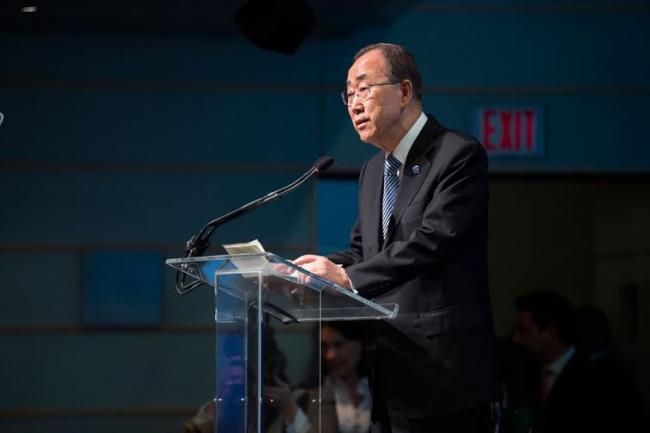Just Earth News 17 Apr 2016

World Bank/Grant Ellis
Arriving in Washington, D.C., this morning to attend the annual spring meetings of the International Monetary Fund and the World Bank Group, the UN chief participated in an event on the development challenges of forced displacement.
Recalling his visit in March with World Bank President Jim Yong Kim to the Middle East region, including Jordan and Lebanon, Ban said they heard the stories of thousands of refugees, and he was “deeply moved, especially by the dreams and resolve of the young people.”
“Above all, this is not just a crisis of numbers – it is also a crisis of solidarity,” Ban said.
The Secretary-General also underscored that on Friday’s internal displacement and refugee crises are signs of deeper challenges that must be resolved – from Syria to Afghanistan to South Sudan.
To that end, he will be convening the first-ever World Humanitarian Summit in Istanbul next month to provide a platform “to put a focus on root causes and prevention, to bridge the gap between humanitarian and development assistance, and to improve our global response to forced displacement.”
The World Humanitarian Summit will fuel “much-needed momentum” for the Summit on Addressing Large Movements of Refugees and Migrants, which is scheduled in the UN General Assembly for 19 September.
Ban also stressed that world leaders must recognize that on Friday’s internal displacement and refugee crises are signs of deeper challenges, and show greater solidarity not just through relief, but through resettlement and other legal pathways.
“Refugees have a right to asylum – not bias and barbed wire,” he said.
Noting that he, too, was once a displaced person, Ban also emphasized that refugees bring new skills and dynamism into aging workforces, and are “famously devoted” to education and self-reliance.
“When managed properly, accepting refugees is a win for everyone,” he said. “Demonizing them is not only morally wrong, it is factually wrong,” he added.
The Secretary-General also spoke at the Inaugural Assembly Meeting of the Carbon Pricing Leadership Coalition, which brings together multilateral organizations, governments and the private sector.
He emphasized that it is essential for multilateral financial institutions and the private sector to provide the policy instruments and resources needed to support the transformation to a low-carbon, climate-resilient economy.
“Markets must play a central role in managing climate risks,” the UN chief said. “We must put a price on pollution, and provide incentives to accelerate a low carbon pathway.”
Market prices, market indices and investment portfolios can no longer continue to ignore the growing cost of unsustainable production and consumption behaviours on the health of our planet, he said.
Hailing the Inaugural Assembly as an “important step” in consolidating the gains made in the Paris Agreement, the Secretary-General said he was “very encouraged” to see that businesses view carbon pricing as an efficient, cost-effective means of reducing emissions.
“Momentum is building. However, we must ensure the provision of timely and meaningful assistance to developing and vulnerable countries for their mitigation efforts. Promises made must be kept,” Ban said.
“Greater international cooperation is vital for building a low-carbon, climate resilient world,” he added.